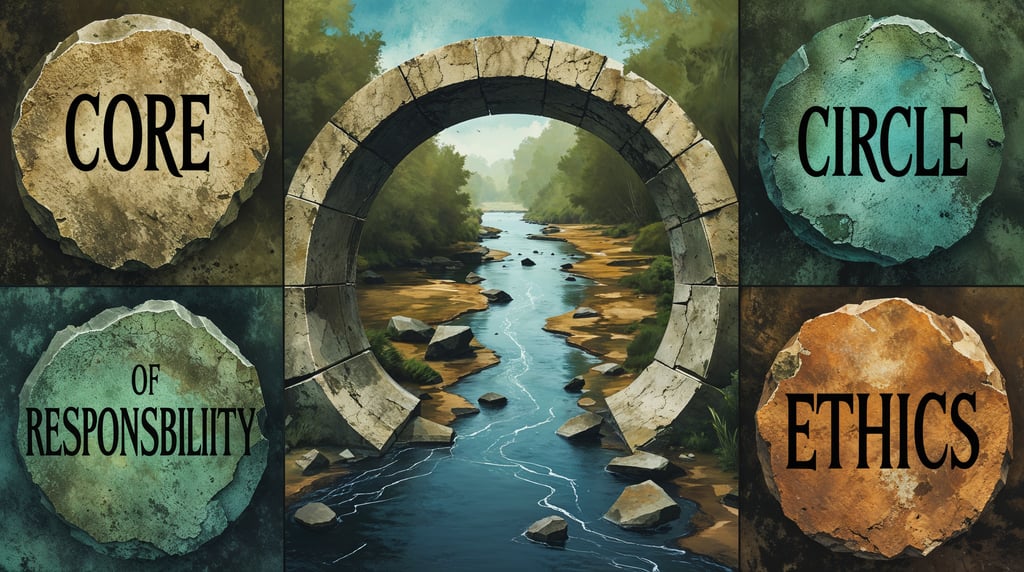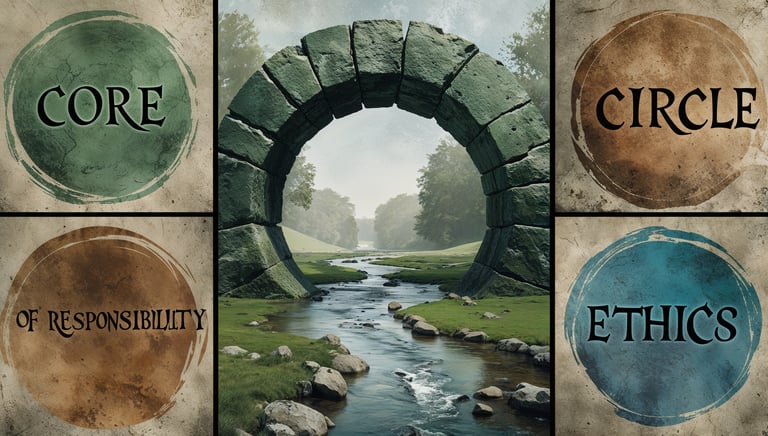CORE: Circle of Responsibility and Ethics
Stabilize and expand your circle of responsibility and your growing ethical concerns through well balanced protection-sacrifice dynamics.
4FORTITUDED - DEFENSE, RESISTANCE, POLITICS, HISTORYFEATURED


CORE: Circle of Responsibility and Ethics
Let's discuss what you might call embodied responsibility. As a man, and if you're fortunate, a husband and father also, you know that you are always balancing care for yourself with that of an ever-expanding circle of those you are responsible for and dutiful to be ethical towards. : Cultivating the CORE of Self, Others, and Ethical Sacrifice
The Quiet Strength of the Warrior as Husband and Parent
Within every individual exists a layered presence: a contemplative philosopher, a protective warrior, and a nurturing parent. We reason about values, defend what we cherish, and shape tomorrow's world through the care we offer our families, communities, and anyone touched by our influence. To fulfill these roles, we need a unifying ethos—a framework that harmonizes personal vitality with expanding moral obligations.
This framework is "CORE: Circle of Responsibility and Ethics." It recognizes that caring for the self is not indulgence, but the foundational bedrock for serving others. Think of it as cultivating fertile soil: by enriching ourselves in virtue, clarity, and well-being, we grow into reliable providers of ethical sustenance. And yet, as CORE teaches, there may come a moment when self-care yields to self-giving, when the comfort we've built is released to uphold a greater moral structure.
The Warrior's Path: Strength in Service
Before delving deeper into the CORE model, we must understand the warrior's mindset that underlies this philosophy. The true warrior knows that strength exists not for domination, but for protection and service. Like the samurai of old who lived by bushido, or the knights who upheld chivalric codes, our power finds its highest expression in defending those who depend upon us. This warrior spirit infuses every aspect of the CORE framework, demanding both fierce dedication and gentle wisdom.
Understanding the CORE Model
Picture concentric circles radiating from a central point—yourself. You stand at the center, tasked with cultivating personal virtue, health, and spiritual insight. The next rings encompass family and close friends, who benefit from your moral stability. Moving outward, these circles extend to neighbors, community, and ultimately the broader world.
"Ethics" in this sense is not merely a collection of rules, but a shared covenant shaped by communities seeking truth, justice, and resilience. As you move beyond the self, your core virtues guide how you nurture families and societies. Eventually, the need to sustain communal well-being may eclipse your own comfort, like a candle sacrificing its wax to bring light to others.
The Four Pillars of CORE
Personal Integrity as Ethical Bedrock
Without honesty, courage, and self-respect, external actions lack true moral force. As Marcus Aurelius cautioned, "Waste no more time arguing about what a good man should be. Be one." This means embodying virtue before attempting to spread it to others.
The foundation of personal integrity within CORE requires:
Unwavering commitment to truth, even when inconvenient
Physical and mental discipline that forges resilience
Spiritual groundedness that anchors moral decisions
The courage to face one's own weaknesses and grow from them
Outward Expansion of Care
Moral impact ripples outward, like stones tossed in a still pond. In the parable of the mustard seed, a small seed of virtue, once nurtured, grows into a sanctuary for many. This expansion represents the natural progression of ethical responsibility.
The expansion follows as such: A sacred geometry of sorts
From self to family
From family to community
From community to society
From society to humanity
Self-Sacrifice for the Greater Good
Sometimes, moral preservation demands personal cost. "Greater love has no one than this: to lay down one's life for one's friends" (John 15:13). This pinnacle of love exemplifies the ultimate willingness to sacrifice.
True sacrifice requires:
Discernment to recognize genuine need
Courage to act despite personal cost
Wisdom to sacrifice effectively
The strength to endure the consequences
Contextual Balancing and Recalibration
The art lies in discerning when self-care takes priority, and when it must cede to altruism. The Daoist tradition reminds us that "The Way is not static." We must adapt with wisdom, guided by moral principles rather than mere whim.
The Sacred Dance: Self-Care and Self-Sacrifice
It may seem paradoxical to devote yourself to personal growth, only to surrender it. Yet nature reveals this cycle repeatedly: a mighty oak stands firm through seasons of nourishment, only to fall and become the soil for new life. Self-care is not an endpoint; it is the root system of your moral capacity. When sacrifice is required, you will not be an empty vessel, but a sturdy presence shaped by disciplined self-cultivation.
Stoazen: The Warrior's Philosophy
Stoazen represents the synthesis of Stoicism, Taoism, and Zen Buddhism, creating a practical framework for the warrior-philosopher. It emphasizes:
Stoic Resilience
Mastery over the self
Emotional sovereignty
Unshakeable moral conviction
Taoist Harmony
Flow with natural laws
Strategic adaptability
Balance of opposing forces
Zen Clarity
Mental stillness in chaos
Direct perception of truth
Freedom from attachments
The Warrior of Christ
A Follower of Christ embodies divine strength through:
Spiritual Warfare
Standing firm against moral corruption
Defending truth in an age of confusion
Protecting the vulnerable with righteous strength
Servant Leadership
Leading through example and sacrifice
Balancing justice with mercy
Cultivating wisdom through humility
Divine Purpose
Aligning personal will with God's plan
Building eternal legacy through temporal action
Embracing the role of spiritual warrior
Practical Integration: Living the CORE
Daily Practices for Warriors
Dawn meditation and prayer
Physical training with spiritual focus
Tactical preparation for ethical challenges
Evening reflection and moral inventory
Family Leadership
Modeling virtue through action
Creating protective boundaries
Teaching through guided experience
Building generational resilience
Community Impact
Strategic service initiatives
Mentor relationships
Crisis preparation and response
Building ethical infrastructure
The Weight of the Crown: Leadership Through CORE
True leadership emerges from the complete integration of CORE principles. The warrior-leader bears responsibility not just for actions, but for the moral ecosystem they create. This requires:
Sovereign Self-Governance
Rigorous self-discipline
Emotional mastery
Ethical consistency
Strategic wisdom
Kingdom Building
Creating sustainable systems
Developing future leaders
Establishing ethical cultures
Preserving moral heritage
The Path of An Eternal Warrior
The CORE framework forges individuals who stand as pillars in an age of moral uncertainty. By balancing self-development with sacrificial service, we create a legacy of strength, wisdom, and ethical leadership. This is not merely philosophy—it is a way of life that demands everything while promising the only reward worth seeking: a life of meaning, purpose, and lasting impact.
The warrior who fully embodies CORE becomes both sword and shield, both oak and soil, both student and teacher. In this sacred balance lies the power to transform not just individuals, but entire communities, carrying forward the eternal flame of virtue for generations to come.


